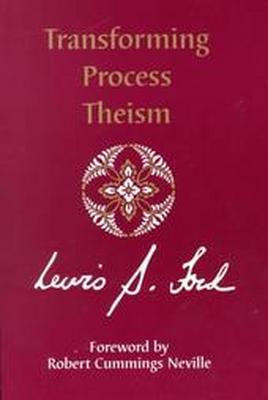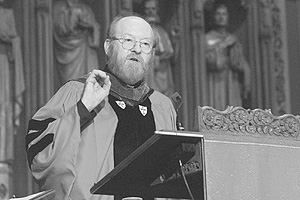
AnthonyFlood.com
Panentheism. Revisionism. Anarchocapitalism.


From Journal of the American Academy of Religion, Vol. 38, No. 2. (June 1970) 217-219. A review of Robert C. Neville, The God the Creator: On the Transcendence and Presence of God, Chicago: The University of Chicago Press, 1968. Pp. 320. See also Neville's Foreword to Ford's Transforming Process Theism, elsewhere on this site.
A Review of
Robert Cummings Neville, God the Creator
Lewis S. Ford
Perhaps the most basic (and perplexing) question confronting philosophical reflection about the nature of God is whether God ought to be construed as an individual being maximally exemplifying the fundamental categories of being. Whitehead, following Leibniz, thought so: God cannot be an exception to the metaphysical principles, invoked to save their collapse; he is their chief exemplification. Tillich, in contrast, insists with equal if not greater vehemence that superlatives when applied to God become diminutives, for even as the highest being, God is a being, subject to the categories of finitude. God is rather being-itself, the underlying ground of being for all particular beings.
Neville’s God the Creator is a definite contribution to this on-going debate, a highly sophisticated defense of the thesis that God is being-itself. Tillich defends this claim by making it the basis of an elaborate systematic theology designed to reflect the persuasiveness of this approach in all areas of theological endeavour. Neville’s focus of concern is considerably narrower, but advances this defense in two directions beyond the point where Tillich left it: the opposing thesis that God is a being is carefully considered and found wanting, and an alternative cluster of arguments in support of Tillich’s thesis are constructed which do not depend upon the Kantian presuppositions of his arguments about the “categories of finitude.”
The book makes great, probably excessive, demands upon the reader’s alertness and perseverance, for much of the argumentation is extremely abstract. Nor does it become clearer as the book progresses, for Neville has essentially one underlying argument, though it is explored in countless variations, each of which illuminates some additional aspect necessary for its full appreciation. However, the initial uncertainty as to the argument’s meaning, and its cumulative repetition, do represent definite hurdles to be surmounted.
Neville divides his argument into three parts: a substantive ontological argument based on the contingencies of metaphysical determinations, a methodological reflection upon the dialectical moves employed, and a search for evidence in religious experience and practice. These parts are relatively self-contained but are largely intelligible by themselves, each in turn being more concrete. We recommend beginning with the second part, possibly even the third, for these place the earlier parts in a more specific context by which they can be understood. Chap. V is particularly helpful, for it indicates the particularly abstract sense in which key terms are being used.
Creation often refers to the formation of galaxies, stars, planets, living organisms, and so on, usually with respect to God’s role in this process. Neville, however, abstracts from all such considerations, limiting creation to the activity whereby being-itself provides being to all particular beings and their determinations. Here the accent is upon the determinations, those distinctive properties which distinguish one being from another, particularly the most generic properties which constitute the fundamental metaphysical principles. Cosmology and cosmogony are used in equally abstract ways. One might suppose them to be concerned with the structure and origin of the physical universe, but in Neville’s hands cosmology signifies any philosophical theory which is finally based on the articulation of a fundamental set of metaphysical principles, whereas cosmogony refers to the grounding of such metaphysical e principles in a theory of being-itself.
Neville’s principal argument is tended to exhibit the insufficiency of all cosmologies in this sense, not in terms of the specific shortcomings of particular examples (e. g., Aristotle, Leibniz, e Whitehead,) but in terms of the ideal they envision for metaphysics. Metaphysics as a “theory of principles” seeks an interlocking set of perfectly general principles in terms of which all experience can be explained. These form a particular set of determinations having a certain de facto unity. Neville contends that this determinateness and this unity also require explanation which these principles themselves cannot supply. This system of first principles may display an internal coherence in that each one in turn is required by the others, but this is not considered sufficient, “for the circular system of explanations as a whole is not explained” (p. 134). It is the unity of the whole that is sought, and cannot be found on the level of that which is determinate. The unity and determinateness of these determinations can only be explained by an appeal to an absolutely indeterminate being-itself which created them. This metaphysical ultimate, in turn, is identified with the God of religious worship.
Neville is fully prepared to defend the sheer indeterminacy of God. He is determinate only insofar as he creates determinations, and even his role as creator does not apply to his underlying “essence.” We can proceed from cosmology to its grounding in an ontology of creation, but not vice versa. Creation accounts for the being of all determinations, but it “does not explain how the determinations come to be as they are. Creation does not proceed according to principles such that the principles explain why the creation is as it is, for all determinate principles are among the things created” (pp. 134 ff.).
This argument has two principal junctures: (1) Does metaphysics as a theory of determinate principles need to be grounded in that which is absolutely indeterminate? (2) Is such a philosophical ultimate of sheer indeterminacy supremely worthy of worship? I am inclined to accept Neville’s extensive argumentation in affirmation of the first, while regarding the conclusion of much less importance than he attaches to it, since the second contention is much more doubtful.
God is, on most accounts, both one and actual. That which is absolutely indeterminate is neither one nor many, neither actual nor non-actual. While it is true that the determinations require being-itself for their existence, being-itself requires the determinations in order to articulate its unity and actuality. At this point, however, we may articulate the determinations of being-itself in a monistic or pluralistic fashion. We may either say that being-itself creates the determinations of the many actualities, implicitly construing it as more of a one than a many, or we may say that the being-itself inherent in each actuality creates its own determinations, thereby construing the being-itself as more of a many than as a one. Thus Whitehead’s doctrine of creativity may be regarded as a pluralistic version of Neville’s creationist ontology. On such a view the creation inherent within us, as we freely determine our actions, belongs to us and not to God and constitutes the ultimate basis of our metaphysical dignity. God is not thereby deprived of a role, but becomes an independent center of creation, the source of all values guiding our creative endeavours.
Posted March 25, 2007